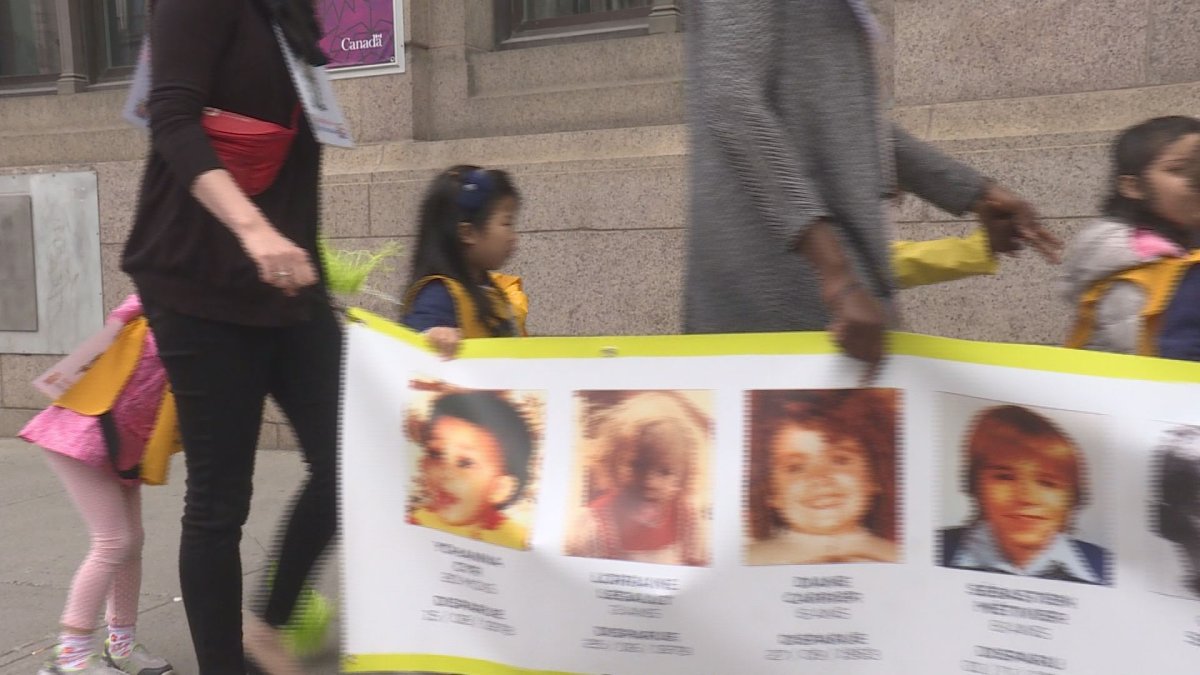In Manitoba and elsewhere, missing persons cases are, sadly, a common occurrence. Would you know what to do if someone you know disappeared?

Help is available for people who may be worried someone has gone missing:
Winnipeg police non-emergency line: 204-986-6222.
Manitoba RCMP divisional headquarters: 204-983-5420. Find contact information for local detachments here.
MissingKids.ca: 1-866-KID-TIPS (543-8477), or view their website.
If you believe a person or child is in serious danger, call 911.
Missing persons cases involve people of any age who are lost or abducted, have run away or have mental health issues, among other things.
One week ago, Morden RCMP confirmed the death of Marie Pluschnik, a 25-year-old who had been reported missing days before.
Her body was found in the rural municipality of Stanley Feb. 11, some three kilometres from her car, which RCMP said appeared to be have been stuck in a snowdrift. While autopsy results have not yet been released, police said there were “no obvious signs of foul play.”
On Thursday, police in Ontario issued an Amber Alert for 11-year-old Riya Rajkumar. Tragically, the girl was found dead a short time later. Her father has since been charged with first-degree murder.
- Train goes up in flames while rolling through London, Ont. Here’s what we know
- Budget 2024 failed to spark ‘political reboot’ for Liberals, polling suggests
- Wrong remains sent to ‘exhausted’ Canadian family after death on Cuba vacation
- Peel police chief met Sri Lankan officer a court says ‘participated’ in torture
While the investigations in these two cases, and countless others, continue, parents everywhere ask themselves, “What would we do if it happened to us?”
Global News spoke with missing persons experts with a view to helping families answer that very question.
Based in Winnipeg, the Canadian Centre for Child Protection works to educate, assist in locating and advocate for missing or exploited kids.
Wayne Hardy served with the Winnipeg Police Service for 28 years. He is now a private investigator.
Amanda Pick is the Chief Executive Officer of the Missing Children Society of Canada.
The experts say regardless of the circumstances, there are some common misconceptions about what to do if you suspect someone you love has gone missing.
Myth: People worry too much, often overreact
Hardy said that too often, people with concerns don’t react and then carry guilt for not having done anything. There are ways to take action, he says, even before involving the police.
“If you are a family member, friend or co-worker, and you feel someone is missing or needs help, do some of your own investigating first. Phone other friends or relatives as to when this person was last seen.”
He suggests asking yourself, or others, the following questions:
- Does the missing person have a cell phone?
- Are they depressed?
- Are they driving in their vehicle?
Hardy said it is essential to collect as much information as possible.
“Why are they missing, when did they go missing, who saw them last … don’t procrastinate — react,” said Harding, adding that you should share your information with police if you are truly concerned.
Myth: You have to wait a certain amount of time before calling police
Hardy said in Winnipeg there is no minimum time requirement.
“You do not have to wait a 12- or 24-hour reporting time,” Hardy said.
“There is no law in Canada requiring a waiting period before reporting a missing child to the police or before entering the data into the CPIC (Canadian Police Information Centre),” said Pick, adding that time is of the essence when it comes to missing kids. She said the first 48 hours are the most important.
MissingKids.ca states that even though most missing children are safely located, it is very important that each case be treated as an emergency.
Myth: You have to go to the police station to file a report
“You can report it via the internet, in person, or phone the regular police line. If it’s an emergency you phone 911,” Hardy said. That applies whether the missing person is an adult, teen or child.
You can also get help from the Canadian Centre for Child Protection online. Fill out an intake form here.
The centre also offers detailed information about the types of missing persons cases and how to search for a missing child, teen or young adult.
Preparation is key — especially when it comes to kids
While no one wants to think their loved ones could ever go missing, the experts all say it is best to know what to do in advance, just in case you ever find yourself in a situation of need.
- Stay calm and look around — kids can wander off or intentionally hide then fall asleep.
- Call hospitals and clinics as well as friends (particularly out-of-town friends) to see if the missing person has turned up somewhere or contacted someone.
- Contact local police as soon as you are aware your loved one is missing; gather primary information (see bullet list below).
- Contact anyone, anywhere the person frequents — school, friends, coaches, counsellors, employer, etc. Ask others to alert you if they spot them.
- Make a list of potential places in the community where they may have gone; call to see if they are there.
- Look for notes or clues as to where they might be going — check phone calls, emails, social media, diaries, etc.
WATCH: Crisis text line added by Kids Help Phone

Experts suggest having key information about your child available to share with authorities:
- Keep updated photos of your child.
- Take note of what your child is wearing each day.
- Be prepared when in crowds.
- Be aware of your child’s behaviour changes – this is often a critical factor in the case of runaways.
- Record your child’s information with a child identification kit.
In Manitoba, parents and guardians can get a free identification kit from any RCMP station.
“Each of our detachments throughout the province have been provided with the child identification kits that anyone can pick up free of charge at their convenience,” said Sgt. Paul Manaigre.
Manaigre said parents being well-prepared is critical in ensuring the well-being of their children, adding that the missingkids.ca website is an excellent source of information.
“We cannot stress enough the importance of being well informed.”
When it comes to keeping kids safe, all concerned agree that parents need to be proactive, to reach out, to ask for help. Use social media, online resources and organizations qualified to assist.
And don’t rely on someone else to tell your kids what to do.
Teach your child your phone number so they can contact you if they become lost or are in danger.
And talk to your kids about how to practice safe social media — ensure they know the risks of sharing too much information online.
If you aren’t sure where to start, click here for a list of talking points and safety strategies.
WATCH: The Canadian Centre for Child Protection shares some of their programs during Missing Kids Month





Comments